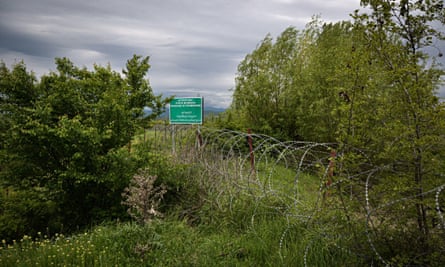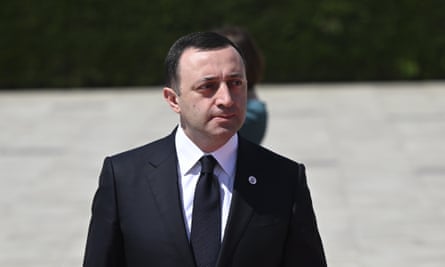Georgians dream of EU membership as their leaders move closer to Putin | Georgia
Around the Georgian village of Khurvaleti, Russia’s occupation can creep forward a few yards at a time, often in the middle of the night. It often starts with a line ploughed across a field. Then a green sign will materialise, warning people not to cross. Then the concertina wire appears.
Khurvaleti is at the southern edge of South Ossetia, a breakaway region occupied by Russian troops since a five-day war with Georgia in 2008, in what proved to be a dress rehearsal for Ukraine. Now on the defensive after Putin’s botched Ukraine invasion, Moscow has shifted troops and equipment from Ossetia.
There are few soldiers to be seen in the two military bases built in the hills on either side of Khurvaleti. But Georgians fear that if Russia were to prevail in Ukraine, Putin’s forces will be back to take another bite out of Georgia, most likely with the intention of swallowing the country whole.
For now, the line marking the extent of Russian occupation is watched by EU monitors who patrol in dark blue Toyotas, looking for new signs of “borderisation”, their word for the steady hardening of boundaries.
“Usually it starts with soft borderisation: ditches, ribbons on trees that show demarcation between the two different sites,” said Klaas Maes, a spokesperson for the monitoring mission. “Then it goes on to hard borderisation, where the ditches become fences, the fences become barbed wire, and then barbed wires are then fortified with extra watchtowers.”
Five years ago, the inhabitants of Khurvaleti woke to find their village had been cut in two by a wire fence, and then later, a watchtower was built to guard the barrier. Villagers were suddenly separated from family, friends and their own land. Where there is now fence, the dividing line is enforced by fines and sometimes lengthy prison sentences. The nearest crossing point is 30 miles (50km) away and open 10 days a month. A visit to a relative or friend on the other side of the line now involves a 200km round trip.
If the Russians did strike from South Ossetia, they could cut Georgia’s main east-west highway in a few minutes, and be in Tbilisi within a couple of hours. With Moscow’s troops bogged down in Ukraine, however, the appearance of Russian tanks on the streets of the capital is not an immediate threat. But many Georgians fear that Russia is already taking over their country by stealth, stealing their sovereignty and democracy from under the noses of an overwhelmingly pro-western population.

Opposition parties and civil society activists say the vehicle for this takeover is being carried out by the country’s own ruling party, Georgian Dream, which is ostensibly pursuing EU membership, while turning further towards Moscow.
Earlier this month, direct flights were resumed between the two countries after a four-year break, just when the US and Europe are seeking to isolate Moscow for its invasion of Ukraine. One of the first flights brought the daughter of the Russian foreign minister, Sergei Lavrov, whom the Georgian authorities allowed in at a time when they have been increasingly barred entry to Russian opposition activists. Yekaterina Vinokurova and her husband had come for a wedding, but protesters picketed their hotel and they were ultimately forced to leave, though not before they had highlighted the rift between the government and the people over relations with Russia.
An independent advocacy group for press freedom, Open Caucasus Media, analysed the rhetoric of the Georgian Dream chair, Irakli Kobakhidze, over the first five months of the full-scale Russian invasion of Ukraine, and found 57 negative remarks about the west, 26 about Ukraine, and only nine comments critical of Russia.

Officially, the ruling party is pursuing a Euro-Atlantic future, an aspirant Nato member that is also working to respond to 12 reform recommendations from the European Commission before a decision in December on whether Georgia should be given EU candidate membership status. At the same time, party leaders have adopted rhetoric certain to alienate the alliance and Brussels.
In April, the prime minister, Irakli Garibashvili, met Nato’s secretary general, Jens Stoltenberg, in Brussels, declaring: “Georgia’s Euro-Atlantic aspiration remains our top foreign policy priority.” Just over a month later, he shocked a security conference in Bratislava by blaming Russia’s invasion of Ukraine on Kyiv’s own aspirations for Nato membership.
Garibashvili said: “One of the reasons was Ukraine’s will…
Read More: Georgians dream of EU membership as their leaders move closer to Putin | Georgia

